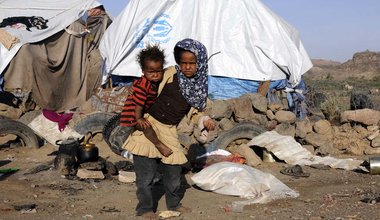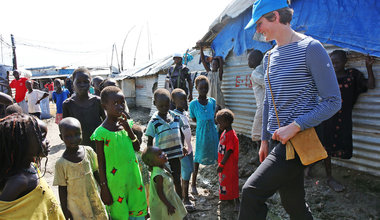UN Women - Working to stem the tide of post-earthquake migration in Nepal
Post-earthquake, the number of migrant workers, including women, seeking to leave Nepal is on the rise and UN Women and partners have intensified awareness programmes and economic empowerment efforts in affected districts.
As the ground continued to shake and news of destruction caused by a 7.8-magnitude earthquake on 25 April from Nepal’s villages started trickling in, Maya Tulachan felt helpless. “I wanted to help, do something… anything,” she remembers.
A few days after the quake, she received a phone call from the UN Women office in Kathmandu inquiring about getting support from Pourakhi, a Nepali organization she is a part of that works to ensure the rights of women migrant workers through the entire process of foreign labour migration—from pre-employment to post-return support. They asked her if Pourakhi could put together some dignity kits, which include emergency clothing, hygiene and non-food items such as solar lanterns. A returnee migrant worker herself, she was able to organize a group of 20 women to help in a matter of hours.
Pourakhi (meaning ‘self-reliant’ in Nepali) is a long-time partner organization for UN Women, that started formally operating in Nepal in 2003 with the help of a USD 7,000 grant from UN Women (then UNIFEM). It works with women migrant workers on the ground and lobbies for their protection.
An estimated 1,500 Nepalese leave the country every day for opportunities abroad. According to Nepal’s Department of Foreign Employment, over 500,000 migrant workers left last year. National Institute of Development Studies show that 2.2 million of the 28 million Nepalese (about 10 per cent of the total population) work abroad. Migrant labourers represent 11 per cent of Nepal’s Gross Domestic Product, according to National Living Standard Survey. According to the Central Bureau of Statistics, women migrant labourers make up 12.4 per cent of the total number of people leaving the country.
Ms. Tulachan, who works at the passport desk of Nepal’s Foreign Employment Promotion Board, says there has been an increase in the number of migrant workers, including women, leaving the country after the earthquake. “People’s homes have been destroyed, they are in debt and they need to rebuild, which means they need money. With [the] scarcity of jobs here in Nepal, the option is to migrate,” she added.
Bijaya Rai Shrestha, Programme Coordinator and one of the founders of Pourakhi, worries that migrant workers, especially women, may be more vulnerable to trafficking, exploitation and abuse as a consequence of the earthquake. Pourakhi is vigilant and has already intensified its awareness programmes in the earthquake-affected districts, but says more needs to be done.
“Government can help. One way is by cancelling their loans, charging no interest or lowering the interest rate,” says Ms. Shrestha, also a returnee migrant worker herself. “There is a bigger social cost when women leave their families and migrate for work; their children grow up without parents and families and are left vulnerable.” She emphasizes that women must play a large role in the reconstruction process, but need to feel financially secure to do so.
With the support of UN Women, women’s groups met in Kathmandu five days after the earthquake to adopt a “Common Charter of Demands for Gender Equality and the Empowerment of Women in the Humanitarian Response”. The Charter calls for the use of a gender perspective throughout the assessment, planning, development and implementation of policies and programmes responding to the disaster. The eight signatories, which represent a diversity of Nepali civil society, highlight the role of women as agents of change and ask that women be provided with livelihoods and income generation based on direct consultation to ensure that activities are tailored to their needs, circumstances and capacities. UN Women has facilitated dialogue between women’s groups and the Government of Nepal, building on its support to the Government in engendering the Post-Disaster Needs Assessment.
Furthermore, to address women’s financial security, UN Women has partnered with the private sector to promote gender-responsive investment. Some companies have signed the Women’s Empowerment Principles, committing to increase the number of women in their workplace, and even creating an award for the use of remittances for sustainable development.
As immediate post-earthquake humanitarian support, UN Women established information centres and multipurpose women centres, which provided information about available relief in the aftermath of the earthquakes as well as referrals for cash-for-work and other income opportunities.
“Ensuring women’s meaningful participation in the post-earthquake recovery and reconstruction process has enormous potential to contribute to building a stronger Nepal,” says Ziad Sheikh, UN Women Representative in Nepal. “It is crucial that women are provided the space and the opportunities to utilize their skills, knowledge and experience to contribute to post-earthquake recovery and reconstruction efforts, and that they are provided the required support to carry out this work.”
 UN
UN






